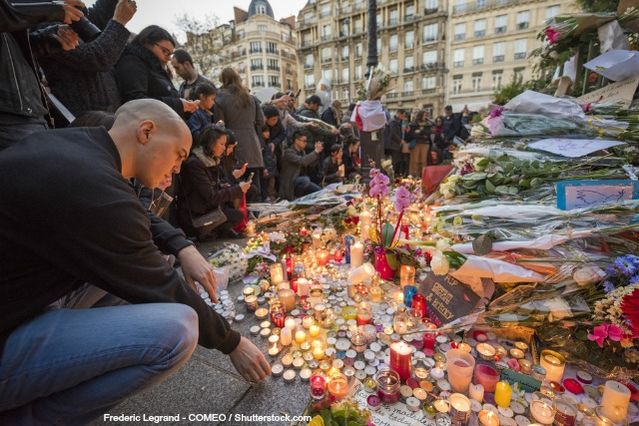Stress
After a Terrorist Attack
History has shown that human resilience wins over terror
Posted April 18, 2016

As a human race, we are resilient. We can become broken, beaten, pushed, bombed and shot, yet still manage to survive physically, emotionally and mentally. The recent, atrocious terrorist attacks in Pakistan, Belgium and France left the public fearful, threatened and with endless questions of “why?” The victims and survivors of the terrorist attacks are not the only individuals affected, but so are their family members, loved ones and the general public who are exposed to the violent and gruesome images broadcasted on news outlets.
Terrorism is a type of mass water torture. You don’t know when the next drop will come. This is a variation of psychological and actual war. It is plugged into the most powerful form of our memory, our emotionally related memory, located mainly in the hippocampus, which sits next to and interacts with the amygdala. As studies have shown with Israeli fighter pilots, each encounter results in greater shrinkage of the hippocampal volume. Yes, it is invisible to our eyes, but it (stress) chips away at our health and longevity. We shall overcome is a song, but rather, we accommodate to progressive disability.
When a city is bombed and people are killed, the ripple effect is felt around the world. This psychological effect of terrorism has become a hot topic since 9/11. With the devastating situation currently occurring in Syria and its surrounding countries, as a human race, it is only natural to be fearful.
The role of fear
Fear is an emotion that we experience after the brain processes a threatening stimulus through the amygdala and releases stress hormones, a process known as the “fight or flight” response.
The amygdala is a small almond-shaped structure located in the brain’s temporal lobe that works to process arousal, emotional stimulation and threatening signs. It works directly with the autonomic nervous system, which is responsible for the release of stress hormones such as norepinephrine and cortisol in response to any type of alarming stimuli. These stress hormones allow the body to prepare for escape in such threatening situations.
Fear is the emotional result after this process has begun. When fear becomes prolonged to the point that it consumes an individual’s mind and daily life, it becomes pathological. Although the majority of victims directly affected by terrorist attacks develop a sense of fear, many are able to cope and move on, whereas a few develop sufficient symptoms to fulfill the diagnostic criteria for acute stress disorder and post-traumatic stress disorder.
Acute stress disorder
Acute stress disorder is a constellation of at least nine symptoms from different categories — including intrusion, negative mood, dissociation, arousal and avoidance — which occur at least for three days and last up to one month after an individual experiences a traumatic event such as physical violence or a terror attack, or learns that these traumatic events occurred to a loved one. These events must affect an individual to the extent that they cause impairment in at least one area of functioning such as social or occupational.
Acute stress disorder is different from PTSD in that it only lasts up to one month, whereas PTSD is diagnosed after having a month of symptoms that include the persistent re-experiencing of the traumatic events with flashbacks and/or nightmares.
Resilience wins
Research reveals that, even though acute stress disorder and PTSD do occur for some individuals after a terrorist attack, humans are in fact resilient. As a result, even though terrorist attacks are living nightmares for those who experience them, survivors do move on with their lives.
After witnessing horrific carnage firsthand, including seeing body parts and finding he was covered with blood that wasn’t his own, this 9/11 survivor tells the horrific experiences he lived through when he barely made it out of 1 World Trade Center alive on that infamous day. His riveting story was first published in the January 2002 issue of Esquire. What’s surprising about his story is his resilient human spirit, as told to Cal Fussman in this excerpt:
“When we got back to my place, I collapsed and it all hit me. I cried like I’ve never cried in my life. I finally let loose, and it felt better. My brother helped me pack, and we got to Westchester, where my wife and family had gone. … My mother was there. My dad. My father-in-law. They all hugged me. Then they gave me my son. … I hugged him and sort of started the healing process there. Later, I went to Maine to sit by the ocean for a few days and get my head together. I saw all of my old friends. It was amazing. Everyone I know in my life has called me to tell me they love me. It’s like having your funeral without having to die.”
Also surprising is that the majority of individuals affected by terrorist attacks are able to overcome fear and the negative connotations associated with these acts of violence. Research even shows that individuals come together as a community to form a stronger bond after a terrorist attack occurs. This can be seen by communities holding a memorial or vigil, or the global reaction to the bombing in Paris when millions of Facebook users changed their profile picture to include the French flag. These attacks can bolster a sense of closer ties within neighborhoods, cities, states, countries and even globally, demonstrating that the human race is indeed resilient.
“In some respects the evidence is surprisingly optimistic. Even in the wake of catastrophic attacks such as 9/11, American society overall displayed a quick recovery. In the days immediately after the attacks, stress reactions and anxiety were very common, but these symptoms did not persist; they quickly returned to pre-9/11 levels for most. Psychologists found that the American public tended to be remarkably resilient in dealing with terrorism and this has also been the finding in regions which experience terrorist attacks on a frequent and widespread basis,” according to an article in the American Academy of Experts in Traumatic Stress.
We live in a terrifying world, but in one that has multiple silver linings. Sometimes it is difficult to work through the fear, but it is important to do the best we can, to come together as a community, to express gratitude for the positive things and to look for the silver linings in situations, even in terrorist attacks. After all, history has shown that human resilience wins over terror.
Contributed by Kristen Fuller, M.D.




